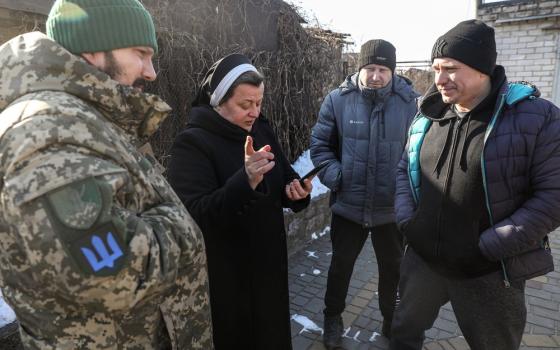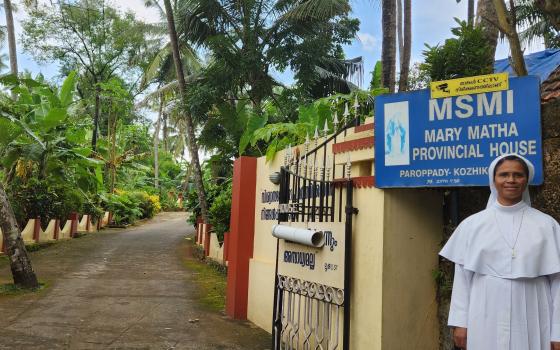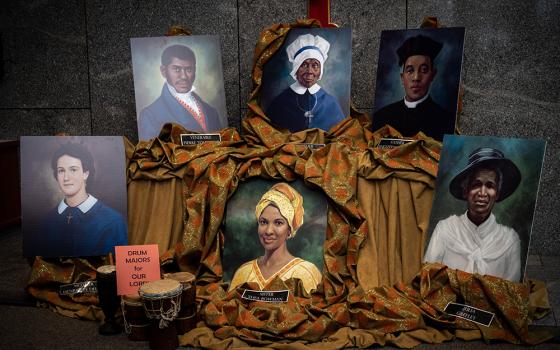
Srs. Jane Wakahiu (right) and Alessandra Smerilli are pictured during the May 30 convening sessions organized by the Conrad N. Hilton Foundation's Catholic Sisters Initiative at Taj Pamodzi Hotel in Lusaka, Zambia's capital. (GSR photo/Doreen Ajiambo)
More than 118 partners, the majority of them religious sisters from more than 15 countries worldwide, convened in Lusaka, Zambia's capital, May 29-31 in a gathering organized by the Conrad N. Hilton Foundation's Catholic Sisters Initiative.
The convening allowed partners to continue networking, collaborating and learning from each other by sharing experiences and ideas to improve their various ministries. These include providing care to the vulnerable, educating children, spiritual ministries, fostering peace, and advocating for justice for those facing oppression. The convening theme was "Embracing a Shared Vision," which is impact, learning and collaboration in service of the common good.
Sr. Jane Wakahiu, a member of the Little Sisters of St. Francis of Assisi, said the gathering also deepened partners' understanding and practice of synodality, which is journeying together as the people of God. Synodality reminded partners that through the work of the Holy Spirit in each of them, they can work together to achieve their shared mission of helping humanity.
"The convening's goals [are] to work together, engage with each other and create a network and new connections," said Wakahiu, who is the associate vice president of program operations and head of the Catholic Sisters Initiative at the Conrad N. Hilton Foundation.
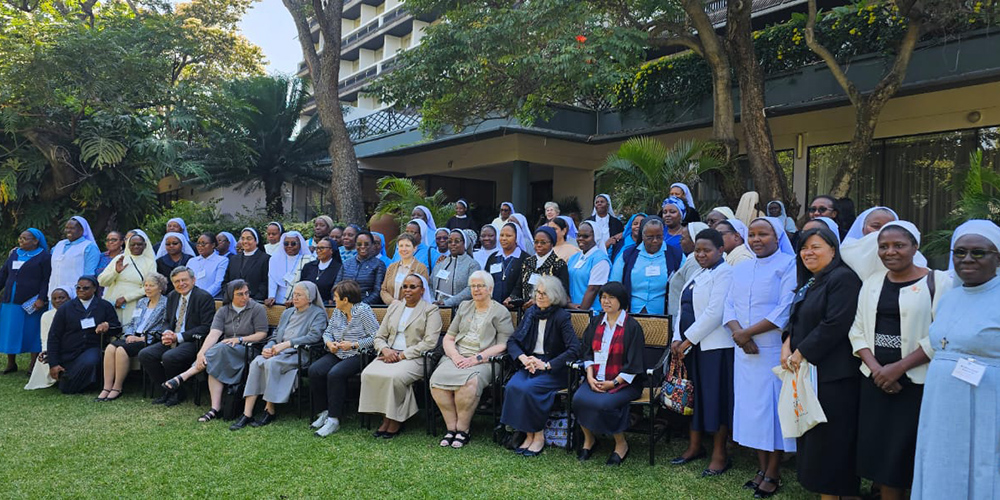
Catholic sisters, grantors, and other partners pose for a group photo during the Conrad N. Hilton Foundation's Catholic Sisters Initiative convening in Zambia's capital, Lusaka. (GSR photo/Doreen Ajiambo)
The foundation supports the ministry and spiritual witness of Catholic sisters and invests in education for sisters, human development services, and other initiatives to strengthen their efforts. The foundation also funds Global Sisters Report.
In an interview, Wakahiu told Global Sisters Report that religious sisters and other partners working on similar ministries needed to merge them for effective delivery and easier access to the foundation's grants. Those working to fight human trafficking, for example, can work together or merge with other sisters or partners in the same ministries in or outside their countries so that they can receive grants as one entity.
"Sisters work to empower the youth, and at the same time, these youth are the ones at risk of human trafficking," she said as one example. "So instead of sisters running these ministries differently, there can be a way they can come together, and we as a foundation will be able to support them as one entity."
"We are delighted to see sisters working together, impacting communities, and the foundation is delighted to see the collaboration among sisters and partners working together to address the needs of the most vulnerable," she said.
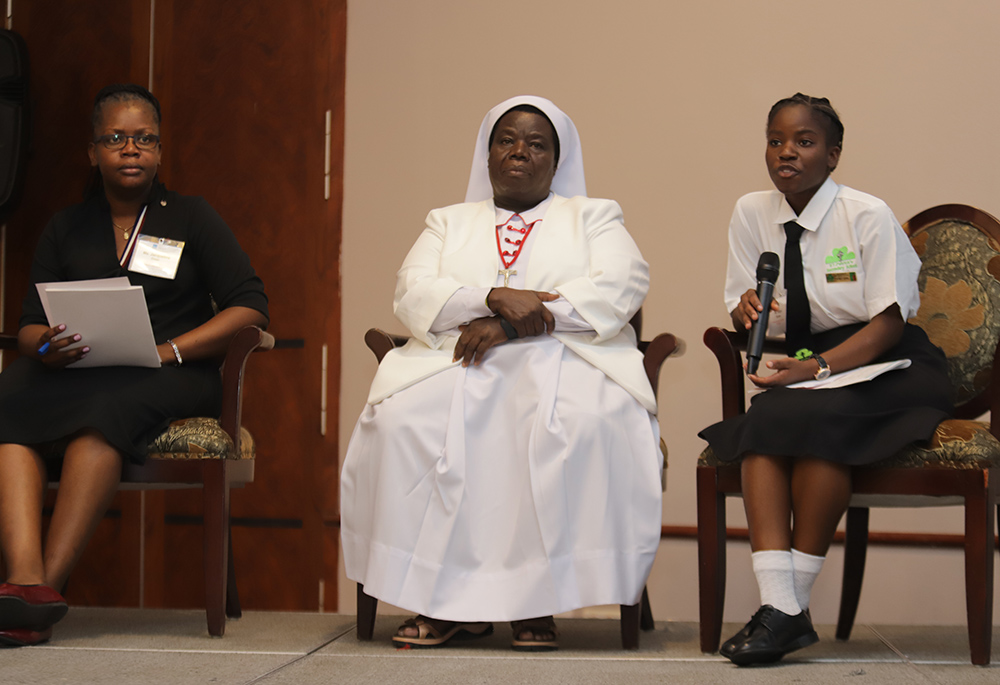
Sr. Sacred Heart of Jesus Sr. Rosemary Nyirumbe leads a panel discussion on the importance of working on empowering youths. (GSR photo/Doreen Ajiambo)
"But despite being in different ministries and receiving different grants, we work towards the same goal of helping humanity," she noted, adding that a shared vision entails empowering the partners and providing focus, direction and inspiration to help achieve greatness. "Therefore, with everyone sharing the same vision, we can achieve these goals effectively through partnership and working together."
During a panel discussion at the convening, sisters and other partners shared their experiences and knowledge about their ministries.
Among the participants was Sacred Heart of Jesus Sr. Rosemary Nyirumbe. She spoke of her work with girls and women in northern Uganda, whose lives have been devastated by civil war, rape and sexual exploitation.
The civil war in northern Uganda that began in 1986 and lasted until 2006 between the Lord's Resistance Army, or LRA, and the Uganda People's Defence Force, or UPDF, had devastating impacts, especially on girls and women. The LRA militias abducted hundreds of thousands of girls and young women, and many were forced to be wives and cooks. Various reports indicate that around 95% of girls and women forced into marriage said they experienced sexual violence during captivity, and more than half of those who returned home had children.
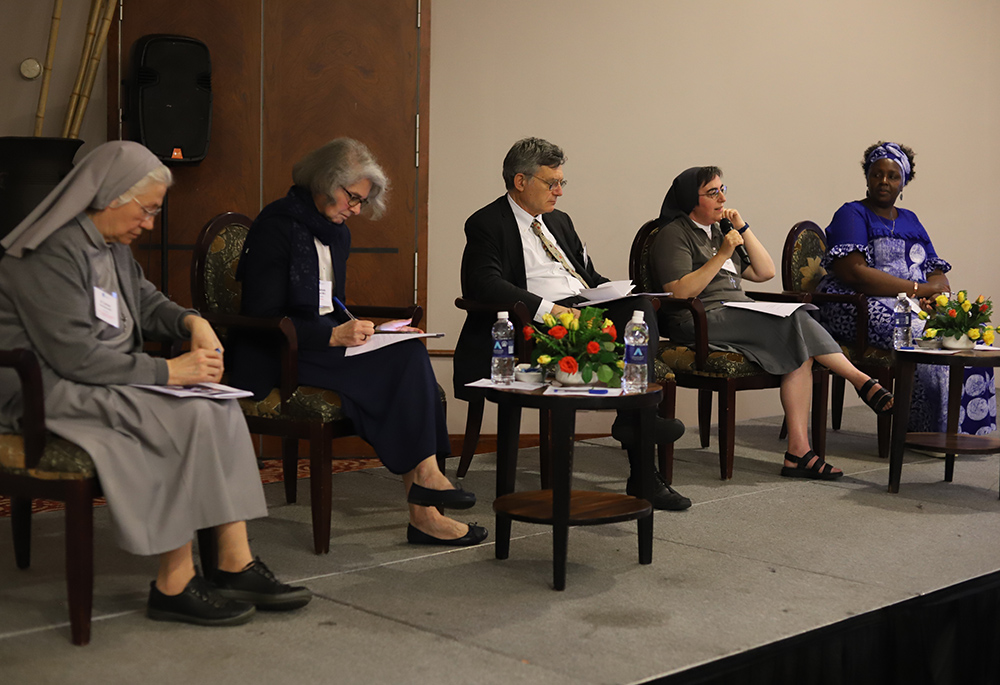
Catholic sisters and other partners are pictured during a panel discussion organized by the Conrad N. Hilton Foundation's Catholic Sisters initiative at Taj Pamodzi Hotel on May 30 in Lusaka, the capital city of Zambia. (GSR photo/Doreen Ajiambo)
For the past two decades, Nyirumbe has been able to offer psychological support to these girls and women, and after healing from trauma, she has been able to enroll more than 3,000 girls at St. Monica's Girls Tailoring Center in Gulu, Uganda, where she empowers them socially and economically through job training in weaving, dressmaking and catering.
"Sometimes, I used to go to the forests to get the girls myself and later allowed any girls who felt insecure about their homes to come in and stay with us at the convent," she said, while encouraging other sisters pursuing similar ministry never to give up until they achieve their goals. "I became a companion to all the girls and a friend, too. I also befriended the rebels so that they leave the girls alone."
Sr. Draru Mary Cecilia, a member of the Little Sisters of Mary Immaculate of Gulu in northern Uganda, shared with the participants during a panel discussion on the role of research in their ministries. The nun, also the executive director of the African Sisters Education Collaborative, or ASEC, explained to participants why research can help sisters nurture their potential and achieve goals.
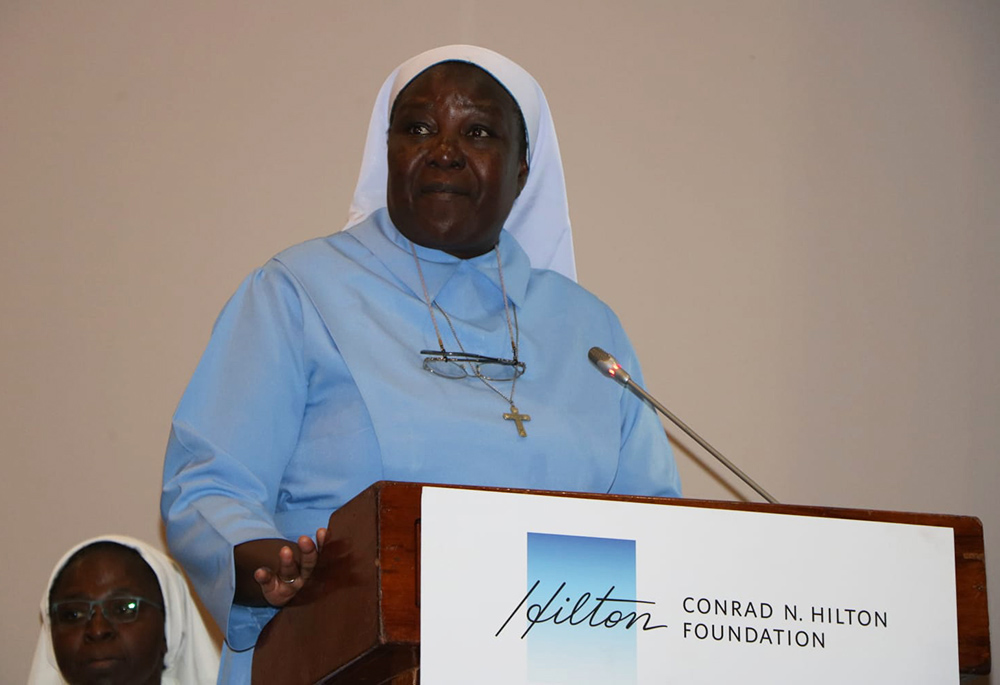
Sr. Draru Mary Cecilia, a member of the Little Sisters of Mary Immaculate of Gulu in northern Uganda, addresses participants during the convening organized by the Conrad N. Hilton Foundation's Catholic Sisters initiative Taj Pamodzi Hotel May 30 in Lusaka, the capital city of Zambia. (GSR photo/Doreen Ajiambo)
"Research is what gave birth to ASEC, and the impact of the research is like the pillars and bridge to link our missions," she said, noting that collecting and analyzing data on the programs run by the sisters and the people they serve gives them all the information they need to function well. "However, as we [sisters] collect data, we receive information, but let us collect real and valid data so people can trust us."
In one of the panel discussions on strengthening the networking between the leadership and the sisters on the ground, Sr. Pasilisa Namikoye, a member of the Little Sisters of St. Francis of Assisi, encouraged sisters in leadership to learn how to listen to other sisters working in their different ministries to help them achieve their goals of serving humanity.
"As leaders in our various religious bodies, we work in different departments, and the sisters are the strings that make everything possible," said Namikoye, the executive secretary of the Association of Sisterhoods of Kenya. "Therefore, we need to listen to the sisters on the ground on what challenges they are going through and what needs to be done so that they achieve their goals."
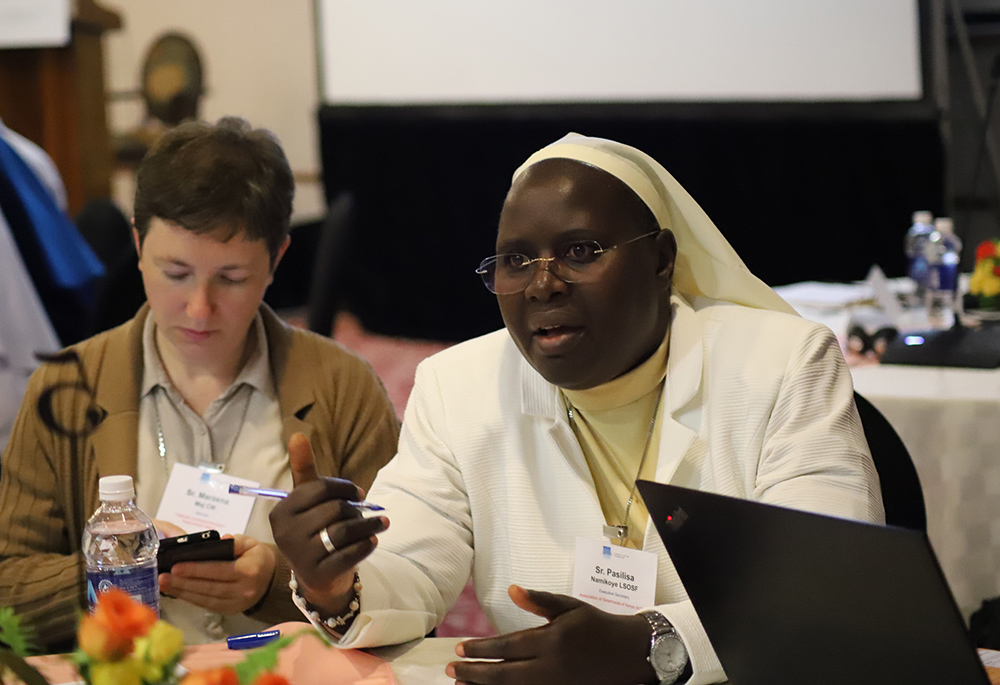
Sr. Pasilisa Namikoye, a member of the Little Sisters of St. Francis and the executive secretary of the Association of Sisterhoods of Kenya, participates in one of the sessions during the May 30 convening. (GSR photo/Doreen Ajiambo)
Maryknoll Sr. Abby Avelino, who leads women religious in Talitha Kum networks throughout the world to end human trafficking, spoke about how the vice is in all aspects of human life and on the importance of including all the sisters' organizations in fighting human trafficking.
"Coming here to meet other sisters in different ministries is a great opportunity to work together to eradicate human trafficking through collaboration," she said, encouraging them to form a greater network to end the vice.
She appealed to the sisters that "if we are networking together, our efforts will bear more fruits rather than just depending on one network."
One of the representatives of the Holy See, Salesian Sr. Alessandra Smerilli, secretary of the Dicastery for Promoting Integral Human Development, spoke about how the Vatican plans to collaborate with local churches to serve people better.
Advertisement
"We want to connect with the local church on the ground, and the only way is through working with the sisters who are the grassroots," she said. "We are going to engage with the sisters more and invite them to come [to the Vatican] and learn how we also do our work and how we can now look for ways to serve the church and move together."
Meanwhile, Wakahiu noted that this year's convening was crucial after a two-year break from the previous one, which took place in Nairobi, Kenya's capital.
"I expect the sisters to leave this place with the right networks and knowledge on how they can work together for the greater good," she said. "As the foundation, we have been able to learn which areas we need to improve on, or if we decide to develop a new strategy, we will know which areas to focus on."



